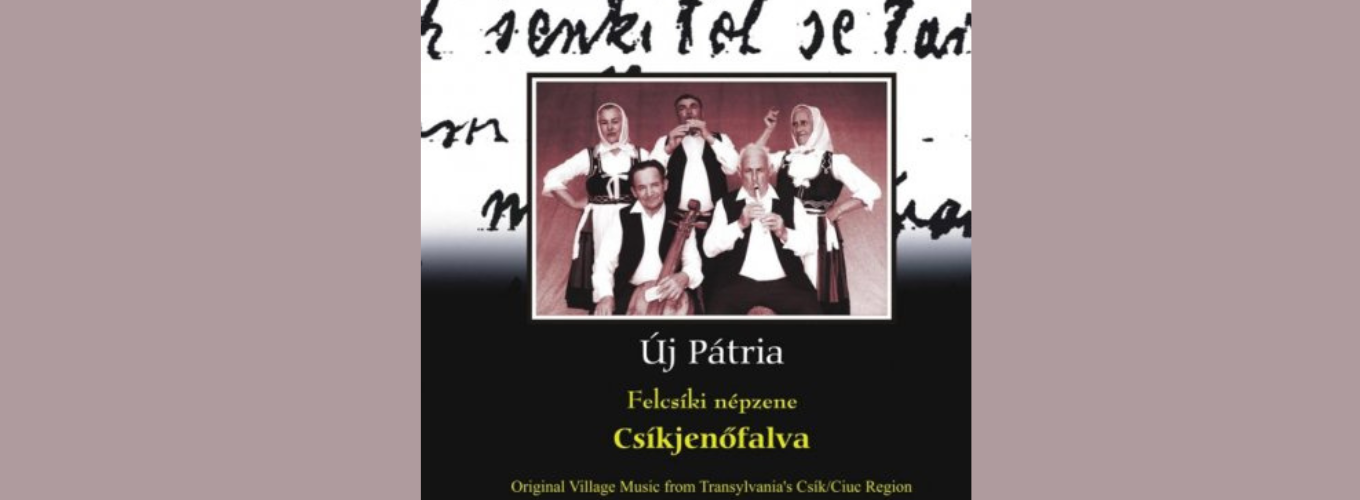
Csíkjenőfalva - Original Village Music from Transylvania’s Csík/Ciuc Region - New Patria series
One of the performers on this recording is András Szentes, who tended herds from childhood. “I started shepherding as a child and the problem was – when we didn’t have anything to do it was easy to doze off. So we would play the flute to stay awake and that is how we learned to play the flute.” A typical story – but not everyone who spent their summers in the mountains became a flute player. “Where I was, there were two people who could play the flute, and I spent many summers up there. One was József Kosza; the other was my pal József Bíró. One was about ten years older than me, the other a year younger.”
András Szentes and József Bíró both learned to play flute as kids from József Kosza. Since Szentes shepherded later in life as well, him and his flute were out in the mountains his whole life. He didn’t really play it anywhere else, “We only played our flutes out in the forest – we didn’t use them at home.”
1. a. Felsütött a Nap sugára
b. Felsütött a Nap sugára
c. Zsuka (féloháhos) (Men’s dance) 4’50”
2. a. Megöltek egy legényt
b. Elvesztettem a kecskéket 2’53”
3. a. Fehér László
b. Zsuka (féloláhos) (Men’s dance ) 6’14”
4. a. Kicsi tinó, nagy a járom
b. Felmászott a Manci az uborkafára
c. Laboda
d. Laboda 7’07”
5. a. Túl a vízen van egy malom
b. Feljött a Nap, szépen ragyog
c. Cepper (Middle class social dance tunes) 2’57”
6. a. Most jövök a vásáralji tanyáról
b. Csárdás (tánccal) (Couple dance) 4’51”
7. a. Hej, Várad felől
b. Októbernek, októbernek elsején 2’03”
8. a. Piros alma csumája
b. Piros alma csumája
c. Piros alma csumája és csárdás 3’32”
9. a. Huszárosan vágatom a hajamat
b. Huszárosan vágatom a hajamat és sebes csárdás
(Soldier’s song, fast couple dance) 2’58”
10. a. Virágos kenderem
b. Virágos kenderem
c. Istenem, Istenem
d. Fekete tyúk mind megette a meggyet
e. Sebes csárdás (Fast couple dance) 3’15”
11. a. Fehér László
b. Lassú csárdás (Slow couple dance)
c. Piros kancsó, piros bor
d. Lassú és sebes csárdás (Slow and fast couple dances) 4’24”
12. a. Jenőfalvi, jenőfalvi bíró kapujába
b. Magyarországi (verbunk) (Men’s recruiting dance) 2’05”
13. a. Csordapásztorok
b. Szent István vértanú éneke
c. Szent István vértanú éneke
d. Ó Szent István, hát még alszol-e (köszöntő) 7’45”
14. a. Keserves (Lament)
b. Keserves (Jó estét, jó estét) (Lament) 3’28”
15. a. Verd meg Isten, ki a gőzöst csinálta
b. Mikor mentem, babám
c. Búzát vittem a malomba
d. Lám megmondtam, bús gerlice
e. Csárdás (Couple dance) 6’43”
Összidő (Total time): 65’43”
Válogatta / Selected by: JUHÁSZ Zoltán
ADATKÖZLŐK / PERFORMERS – INFORMANTS
FARKAS Vilma (1930, Csíkjenőfalva) – ének / voice
FARKAS Margit (1941, Csíkjenőfalva) – ének / voice
SZENTES András (1928, Csíkjenőfalva) – furulya, ének / flute, voice
SZENTES Károly (1935, Csíkjenőfalva) – furulya, ének / flute, voice
KEDVES Dénes (1935, Csíkkarcfalva) – furulya, gardon, ének / flute, hit-gardon, voice